Related Research Articles

Akkineni Nageswara Rao, widely known as ANR, was an Indian actor and film producer, known for his work majorly in Telugu cinema. He starred in many landmark films in his seventy five-year career, and became one of the most prominent figures of Telugu cinema. Akkineni received seven state Nandi Awards, five Filmfare Awards South and a Tamil Nadu State Film Award. The Highest Honour in Indian Cinema Dada Saheb Phalke Award was given on 38th National Film Awards (1990). He was Honoured with Padma Vibhushan (2011), Padma Bhushan (1988) and Padma Shri (1968), India's second, third and fourth highest civilian awards, for his contributions to the fields of Art and Cinema.
Srirangam Srinivasa Rao, popularly known as Sri Sri, was an Indian poet and lyricist who is known for his works in Telugu literature and films. Noted for his anthology Maha Prasthanam, Sri Sri is a recipient of a National Film Award, a Nandi Award and a Sahitya Akademi Award.
Indian epic poetry is the epic poetry written in the Indian subcontinent, traditionally called Kavya. The Ramayana and the Mahabharata, which were originally composed in Sanskrit and later translated into many other Indian languages, and the Five Great Epics of Tamil literature and Sangam literature are some of the oldest surviving epic poems ever written.
The word Mahakavi or Maha Kavi is an Indian honorific which means "Great Poet" in Sanskrit. This may refer to:

Mahakavi Kumaran Asan was a poet of Malayalam literature, Indian social reformer and a philosopher.He is known to have initiated a revolution in Malayalam poetry during the first quarter of the 20th century, transforming it from the metaphysical to the lyrical and his poetry is characterised by its moral and spiritual content, poetic concentration and dramatic contextualisation. He is one of the triumvirate poets of Kerala and a disciple of Sree Narayana Guru. He was awarded the prefix "Mahakavi" in 1922 by the Madras university which means "great poet".
Cingireddi Narayana Reddy, popularly known as CiNaRe, was an Indian Telugu-language poet, writer, and critic. He had produced over eighty literary works including poems, prose-plays, lyrical plays, translations, and ghazals. He was also a professor, film lyricist, actor, and Rajya Sabha politician. He also served as the Vice Chancellor of Telugu University.

Telugu literature is the body of works written in the Telugu language. It consists of poems, short stories, novels, plays, and song lyrics, among others. There is some indication that Telugu literature dates at least to the middle of the first millennium, the first extant works are from the 11th century when the Mahabharata was first translated to Telugu from Sanskrit by Nannaya. The language has experienced a golden age under the patronage of the Vijayanagara Emperor-Poet Krishnadevaraya.
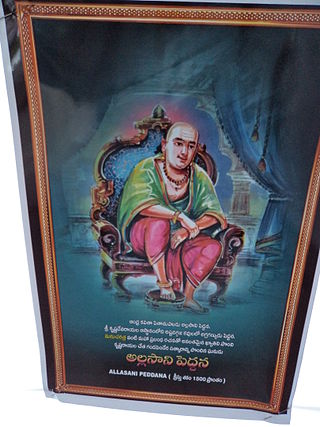
Mahakavi Allasani Peddana was a prominent Telugu poet and the foremost Ashtadiggaja in the imperial court of Emperor Krishnadevaraya of Vijayanagara.

Telugu cinema, also known as Tollywood, is the segment of Indian cinema dedicated to the production of motion pictures in the Telugu language, widely spoken in the states of Andhra Pradesh and Telangana. Telugu cinema is based in Film Nagar, Hyderabad. As of 2021, Telugu cinema is the largest film industry in India in terms of box-office. Telugu films sold 23.3 crore tickets in 2022, the highest among various film industries in India.
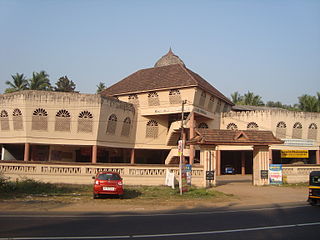
Moyinkutty Vaidyar (1852–1892), often referred to as Mahakavi, is historically considered one of the most renowned poets of the Mappila pattu genre of Malayalam language.
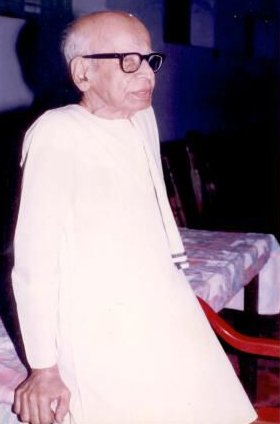
Mahakavi M. P. Appan was a poet and littérateur of Malayalam. He was born in 1913 near Jagathi in Trivandrum district. His parents were Madu and Kochappi. His original name was Ponnappan. He began his career as a school teacher after completing BA Honours from the Kerala University College, Trivandrum. He retired as the District Educational Officer. He had his imprint in the literary field for over 70 years. He was the president of Asan Memorial in Thonnakkal and Mahakavi Ulloor Memorial in Jagathi. He was also a member of the Kerala Sahitya Academy from 1957 to 1967.
Puttaparthi Narayanacharyulu was a classical poet, literary critic, composer, musicologist, translator and polyglot.

The culture of Andhra Pradesh embodies some very exclusive and special entities.

Kalidas is a 1931 Indian biographical film directed by H. M. Reddy and produced by Ardeshir Irani. It is notable for being the first sound film in the Tamil and Telugu languages, and the first sound film to be made in a Dravidian language. It was based on the life of the Sanskrit poet Kalidasa, hence its namesake; it featured P. G. Venkatesan in the title role and T. P. Rajalakshmi as the female lead, with L. V. Prasad, Thevaram Rajambal, T. Susheela Devi, J. Sushila, and M. S. Santhanalakshmi in supporting roles.
Mahakavi Kunnampurathu Varghese Simon was a Malayalam Christian poet from Kerala, India. He was also a musician, a teacher, a reformer, a writer, a Bible scholar and apologist. Simon authored around three hundred hymns or poems and some thirty books. K. V. Simon was given the title Mahakavi by the Sahitya Parishad. His major work was Veda Viharam, based on the biblical Genesis. It was this work, published in 1931, that earned his name among the noted Malayalam poets. Simon was a prominent leader of the Kerala Brethren movement.

The Maha Kavi Moyinkutty Vaidyar Smarakam is a memorial building dedicated to Moyinkutty Vaidyar (1852–1892), often referred to as Mahakavi, who is historically considered one of the most renowned poets of the Mappila pattu genre of Malayalam language.
Vishnupuram Ilakkiya Vattam is a literary organization created by Tamil writer Jeyamohan and his readers and fans. It is named after his noted work Vishnupuram. It is currently based out of Coimbatore in Tamil Nadu, India and is being coordinated by K.V.Arangasamy. It awards the Vishnupuram Award every year.
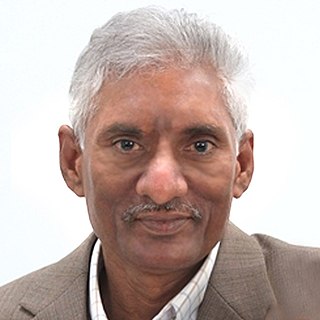
Dr. Papineni Sivasankar, a doyen of Modern Literature in Telugu, recipient of Sahitya Akademi Award, 2016 is an Indian poet, short story writer, and critic.
Cherabanda Raju was a revolutionary poet, novelist, and songwriter, who wrote in the Telugu language. He was one of the six poets who were known for their Digambara (naked) Poetry that flourished during the mid-1960s in Andhra Pradesh.
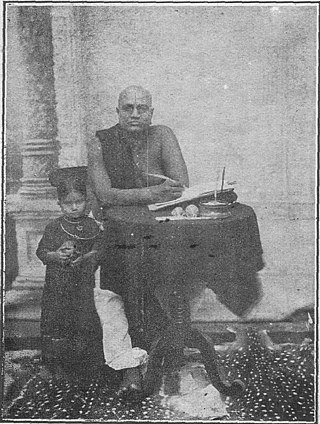
Mahakavi Dasu Sriramulu (1846–1908) was an Indian scholar, poet, orator, author, astrologer, avadhani, translator, and social reformer. He was a lawyer by profession. He was a child prodigy. He had no formal tutelage in these diverse arts – his knowledge was gained through his personal studies and association with scholars and artists.
References
- ↑ T. Venkata Rao (16 September 2006). "Portrait of a revolutionary". The Hindu . Archived from the original on 15 July 2007. Retrieved 13 February 2012.
- ↑ "Rich tributes paid to Sri Sri". The Hindu . 11 September 2009. Archived from the original on 14 September 2009. Retrieved 9 February 2012.
- ↑ "Musical event on Sri Sri tomorrow". The Hindu . 20 November 2010. Archived from the original on 4 October 2013. Retrieved 9 February 2012.
- ↑ "A fitting tribute to a great poet". The Hindu . 1 May 2009. Archived from the original on 5 May 2009. Retrieved 13 February 2012.
- ↑ "A penchant for the poor". The Hindu . 8 July 2002. Archived from the original on 14 November 2003. Retrieved 9 February 2012.
- ↑ "Tribute to 'Mahakavi' Sri Sri". The Hindu. Retrieved 13 February 2012.
Audio of Mahaprasthanam by the poet himself!!
https://www.youtube.com/watch?v=A2M5fqXma5I&t=1159s
Mahaprasthanam https://www.youtube.com/watch?v=A2M5fqXma5I&t=1159s